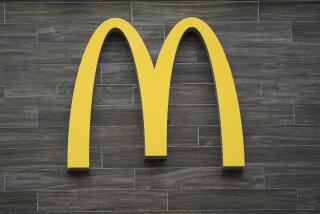Wall St. Short on Growth Stocks
- Share via
January was a bad month for stocks, but it was particularly bad for some of Wall Street’s classic growth issues -- including Coca-Cola Co., McDonald’s Corp., Home Depot Inc. and Altria Group Inc. (formerly Philip Morris).
For the millions of investors who own these shares, the last few years have forced some difficult discussions about what the future holds. Are these still growth companies, or have they permanently lost that designation? Based on the stocks’ performances last month, that question still appears to loom quite large.
The worries about those four companies, and about several other consumer-oriented giants that long had been considered core growth-stock holdings for many institutional and individual shareholders, point up a broader debate in the market: Where should investors be looking for the best corporate profit growth in the next few years?
Any new bull market move, after all, would need leadership -- a group of stocks that get a large swath of people excited about being invested again. Usually, those are stocks of firms with robust growth prospects.
For much of the 1990s, the growth leaders were the consumer titans. Then technology grabbed the leadership mantle in 1998 and ran away with it, and right off a cliff in 2000.
Now, some analysts say there’s a dearth of exciting growth companies to grab investors’ attention. That may seem an overstatement in a $10-trillion economy; after all, there’s always some up-and-coming company taking Wall Street by surprise.
*
Lack of Growth Stocks
But in relative terms there’s a growth-stock drought today, contends Kevin Marder, chief market strategist at money management firm Ladenburg Thalmann Asset Management in Los Angeles. That is so, he said, in part because the market for initial public offerings has been nearly shut down for two years.
The IPO market exists primarily to raise money for young, promising companies with new ideas. With so many investors unwilling to take on the risks inherent in fledgling companies, there is little in the way of fresh growth concepts coming to Wall Street, Marder said.
“There aren’t a lot of growth opportunities and there won’t be until an IPO cycle starts up again,” he said.
Meanwhile, the most dependable growth names for much of the 1990s -- consumer-oriented giants such as Coke and McDonald’s -- continue to battle the perception they no longer deserve the label of “growth stock.”
The problems facing these companies, and the poor performance of their shares, aren’t new. Indeed, Eastman Kodak’s stock peaked in 1997, Coke’s in 1998 and McDonald’s in 1999, all well before the plunge began for the broad market in 2000.
Measured from Dec. 31, 1998, through 2002, Kodak, Coke, McDonald’s and Home Depot all suffered deeper losses than the 28.4% price decline of the average stock in the blue-chip Standard & Poor’s 500 index.
More troubling to many investors in the consumer stocks is that their losses continued to pile up in January. Kodak dropped 13.5% for the month, Coke fell 7.7%, McDonald’s lost 11.4% and Home Depot slid 13%. The S&P; 500, by contrast, was down 2.7%.
Given the sharp decline last month in the dollar’s value against key currencies, Kodak, Coke and McDonald’s might have been expected to rally, since a weaker dollar can boost results from their extensive foreign operations. But the companies have offered investors little encouragement about their businesses.
McDonald’s, struggling to attract consumers whose tastes are evolving away from its type of fast food, in the fourth quarter recorded its first loss since it went public in 1965, after a charge to close more than 700 stores.
Kodak, which is losing film sales as digital photography replaces the firm’s century-old technology, forecast a smaller-than-expected first-quarter profit and said it would slash more jobs.
Home Depot, facing heated competition from rivals such as Lowe’s Cos., in mid-January told analysts to expect sales growth of 9% to 12% in the fiscal year beginning this month, according to Don Trott, an analyst at brokerage Jefferies & Co. A year ago, the company expected annual growth of 15% to 18%, he said.
Home Depot’s earnings in the quarter just ended probably were down 10% from a year earlier, Trott estimated.
Food and cigarette giant Altria Group, which last week changed its name from Philip Morris, said sales fell 5.6% in the fourth quarter from a year earlier, to $18.8 billion, as some smokers switched to lower-priced brands.
Coke last quarter told analysts it no longer would provide guidance about quarterly earnings expectations because management wants to focus on the long term.
But investors who take a long-term view can see that Coke’s third-quarter sales of $5.3 billion were a mere 3.6% higher than sales in the same quarter three years earlier.
Even companies whose sales growth is lackluster can produce above-average earnings growth, however. That feat can be easier for larger companies because they have more to work with -- more costs that can be cut, more assets from which to wring productivity gains, more shares outstanding to buy back (to boost per-share results).
Despite Coke’s struggles in recent years, Wall Street analysts on average expect the company to earn $1.93 a share this year from continuing operations, which would be a 9% gain from the $1.77 a share it is estimated to have earned in 2002, according to Zacks Investment Research.
*
Finding ‘Proper’ Value
How high should the stock price be if Coke can continue to post profit growth of 9% a year?
At $40.46 on Friday the stock was valued at 21 times the 2003 earnings-per-share estimate. That is about half what Coke’s peak price-to-earnings ratio was in the late 1990s.
But is the stock cheap? Putting a “proper” value on a stock is more art than science. A P/E ratio is just one valuation measure. It gives investors an idea of how much they’re paying for a year’s worth of earnings.
Historically, a P/E ratio that is twice a company’s expected annual earnings growth rate has been considered pricey. Whether investors, en masse, believe that Coke still is too expensive relative to its growth rate isn’t clear. But for whatever reason, Coke stock last week fell to its lowest level since 1996 before rebounding a bit on Friday.
Scott Black, a “value”-oriented money manager at Delphi Management in Boston, argues that Coke is indeed too expensive for the growth it can deliver. He said he doesn’t understand why other investors are willing to pay double-digit P/E ratios for Coke and other mature consumer companies that appear capable of only single-digit profit growth.
“It think it’s a lot of lazy money managers who don’t know what else to buy,” so they stick with the names they’ve always known, Black said.
The stocks’ fans see it differently, of course. If the economy picks up speed this year and in 2004, after the Iraq situation is resolved, it’s conceivable that earnings growth would rebound sharply for all sorts of U.S. companies, including the consumer leaders.
Procter & Gamble was another old-line consumer company that fell on hard times in 2000, as rivals ate away at its markets. But cost cutting has helped P&G; stage a strong recovery. The company last week raised its earnings forecast for the current fiscal year, saying it expects 12% to 13% growth.
P&G; stock has surged 62% from its lows in 2000. Investors who have stuck with Coke, McDonald’s, Home Depot and Kodak must be betting on the same kind of reward from those stocks in the next few years.
There may also be a feeling that, with the P/E ratio on a stock such as McDonald’s already at a seemingly low level -- 10 times estimated 2003 earnings -- the share price can’t get much cheaper.
But if McDonald’s problems are worse than expected, and the firm can’t generate much, if any, profit growth over the next few years, how low is too low for its P/E?
Marder and other analysts also point out another challenge these consumer stocks will face once the economy begins to grow at a much better pace: Many investors, as they gain more confidence, will be more likely to go hunting for stocks of truly fast-growing firms, rather than settle for shares of mature businesses whose peak years have passed.
That could favor the now widely despised technology sector again, as well as new growth sectors that will emerge from a revived IPO market, Marder said.
That environment wouldn’t favor sharp gains in the old-line consumer giants, he said.
*
Tom Petruno can be reached at tom.petruno@latimes.com. For recent columns on the Web go to: www.latimes.com/petruno.
More to Read
Inside the business of entertainment
The Wide Shot brings you news, analysis and insights on everything from streaming wars to production — and what it all means for the future.
You may occasionally receive promotional content from the Los Angeles Times.










